Understanding Horror: Taking Up the Controller and Looking Into the Unknown
Mike talks to those who understand horror best about the genre and how it fits into our medium.
This article first appeared on USgamer, a partner publication of VG247. Some content, such as this article, has been migrated to VG247 for posterity after USgamer's closure - but it has not been edited or further vetted by the VG247 team.
Horror in video games has a long and contentious history. The gaming industry built an entire genre around the concept of horror when Capcom released Biohazard/Resident Evil in 1996. That's when "survival horror" became the term we used to describe some of our best horror; games that are a mix of fear and pulse-pounding action.
That's not to say the industry didn't flirt with the idea of horror before Resident Evil. Friday the 13th on the NES did the best with what it had, Human Entertainment released the first Clock Tower for the Japanese Super Famicom in 1995, and Alone in the Dark for PC was the proto-Resident Evil. Resident Evil was a turning point; as our technology improved, so did developers' ability to elicit real fear in players.
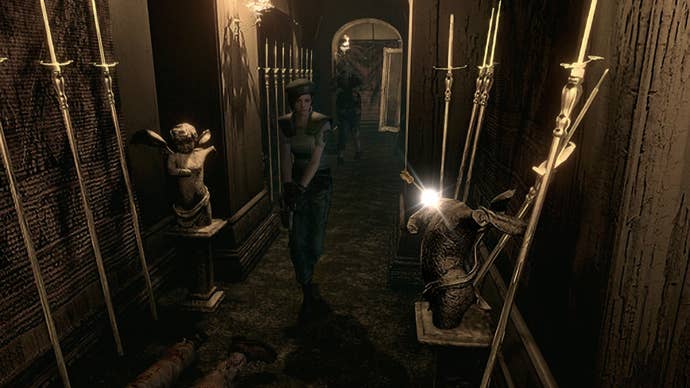
Horror is a tricky thing to capture in any medium, be it games, books, or films. Play it too soft and you have a simple mystery or thriller that creates no real fear. Some works go beyond, graphically-depicting gruesome scenes and actions that would be horrifying in real-life. Horror can absolutely go wrong.
To understand where horror can go right and wrong, I decided to turn to those who understand it best. I spoke to Antony Johnston, writer of Dead Space, ZombiU, and the Nightjar comic mini-series, Brad Miska, co-founder of premiere horror website Bloody Disgusting and producer of the V/H/S films, and Brian Keene, author of horror classics like The Rising and City of the Dead.
Keene had the simplest explanation for what creates great horror: Creating characters that the viewer cares about and then putting them in scary situations. The starting point for any story is creating great characters and putting them through trials and tribulations, the difference in horror is what form those tribulations take.
"Well, for one thing it has to be scary! But that's the rub, isn't it?" Johnston mused. "Not everything scares everyone the same way, or even at all. Heads rolling and buckets of blood doesn't really scare me at all, it just ruins my appetite. To me, horror means foreboding, tension, dread, and the impossible rampaging through the normal world. If you can get that into your scenario -- no matter where or when that scenario might be -- then you've got a great horror story."
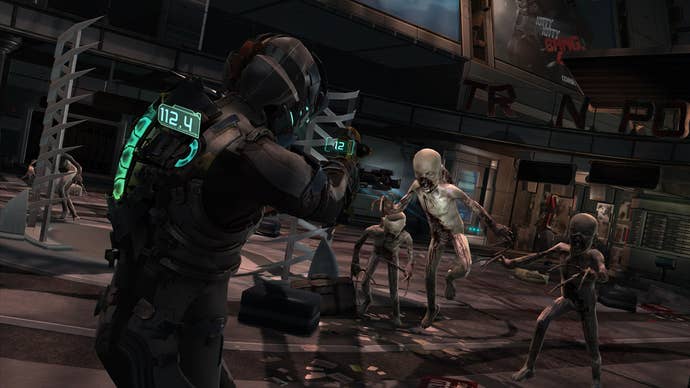
"To me, horror means foreboding, tension, dread, and the impossible rampaging through the normal world."
Dead Space and ZombiU writer Antony Johnston
Brad Miska's expertise is in horror films and he noted that creating an excellent scary movie requires a number of parts all working together. The same can be said for developing a horror game.
"There's actually a lot that has to go right for a horror film to work," stressed Miska. "You need a beautiful marriage of score/sound design, effects, acting, cinematography and editing. If one of those aforementioned items fall flat, the movie probably will as well."
"I think the score and sound design are beyond important: look at films like The Exorcist, Halloween, Psycho, Alien and even Insidious. Music and score can both build suspense and create scares. They act as audio cues for the audience. Good editing also creates suspense, and removes poor exposition and can hide bad acting. Poor effects work takes you out of the movie and can ruin the experience. Quality work makes it all the more believable."
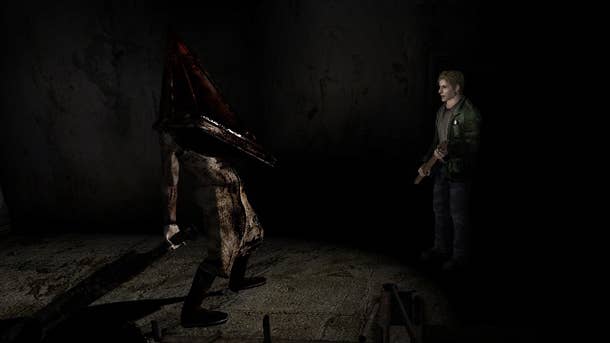
To some, the point of entertainment is to provide escapism, but that idea seems to be at odds with the idea of horror. Why would you want to escape from real-life into a world that scares you? For Miska, that question relies on a misunderstanding of escapism.
"Feeling is escapism," he explained. "I don't really see a difference between Titanic and Halloween, E.T. or even Cujo. All of those films cause the audience to emotionally react, and feeling emotional towards a character in a film is one of the greatest feats a director could ever achieve. It also means that the viewer is 100 percent engaged and lost in the story. That's the definition of escapism - being mentally anywhere but real life."
"Feeling is escapism. That's the definition of escapism - being mentally anywhere but real life."
Bloody Disgusting co-founder Brad Miska.
Keene posited that the real world is so scary, that horror is still an escape: "We've got real monsters: racism, terrorism, genocide, pedophilia, etc. Fictional monsters equals an escape from a scary real world." It's true that all of the problems in horror books, games, and films are easily solvable by surviving or triumphing over a specific foe; the same can't be said of reality.
"Escapism has always struck me as a fairly modern attitude, a privilege of comfortable modern society," Johnston said in reply to my question. "Traditional old stories were often told with purpose. They'd have a moral, or teach a lesson -- sometimes to the point of didactic overload -- or they were simply cathartic. And that's where horror comes into it, and endures. You could hold up Beowulf as the first known horror story, and we're still telling it millennia later."
"Horror gives us a chance to experience fear and terror (the same coin, but two very different sides), to be anxious and apprehensive, to let our imagination run completely wild through the dark places in our mind... and then, ultimately, reassures us that the horrible things in the dark can be defeated, or at the very least countered, by ordinary people," he added. "There are exceptions, like Lovecraftian horror. But even that has a cathartic element to it -- it may ultimately be tragic and nihilistic, but the simple return of the reader/viewer/player to the real world after experiencing such a story is itself positive, I think. The ultimate effect, of shining a light on the darkness, is the same."
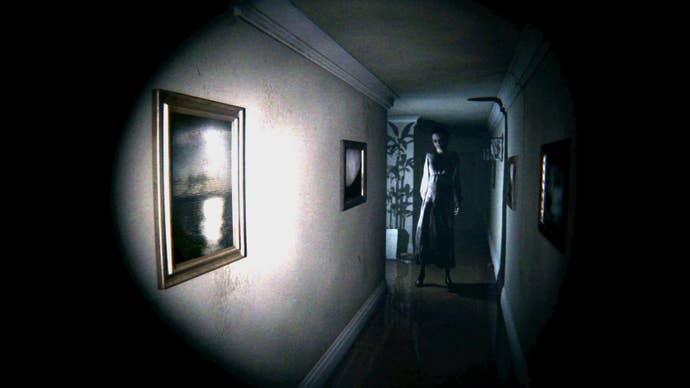
Video games are largely about player agency, providing the player with a series of tools to solve the problem in front of them. At their core, many video games also operate as power fantasies, which stands at odds with vulnerable core of horror. In fact, many survival horror sequels lose what makes the original great by focusing too hard on bigger weapons and action set pieces. Johnston has had the most experience with this push-and-pull, as a writer behind Visceral's Dead Space games and Ubisoft's ZombiU.
"I can't agree with the premise, because I don't think they're power fantasies at all," said Johnston. "Yes, the bad guy is normally defeated in the end, but by definition, the villain is more powerful than the protagonist. Her purpose is to defeat the villain by being smarter than him, not stronger."
"We've got real monsters: racism, terrorism, genocide, pedophilia, etc. Fictional monsters equals an escape from a scary real world."
Author Brian Keene.
"But you're right that designers, and writers, have to cede control to the player, and that can create problems if you're relying on players acting a certain way, or being somewhere at a certain time," he continued. "But that's the same no matter what kind of game you're making. If it's a problem, you need to design smarter. No matter how much control you keep or cede, the most effective horror will always be that of dawning realization -- when the player is already in a situation, or has already done something irrevocable, before they realize that very action has placed them in peril. Nothing can beat that feeling, because it relies on player agency."
I've previously written a thesis for why big-budget sequels and horror don't mix: Horror is predicated on the unknown, whereas AAA sequels trade on familiarity. The best horror sequels start from the same core, but present a new situation, so the entire game still represents the unknown. This is not only a problem in games, it extends to horror movie sequels. The original Nightmare of Elm Street was horror, but by time Freddy's Dead: The Final Nightmare rolled around in 1991, the series was firmly planted in camp. Johnston agreed with part of my premise.
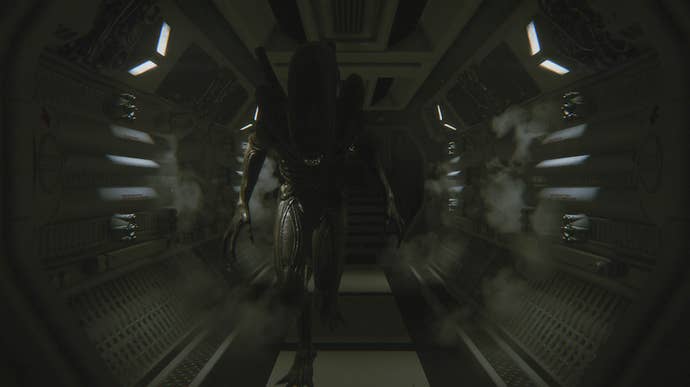
"Aliens is probably the best horror sequel in entertainment history, and it succeeds because it doesn't try to tell the same story all over again, but remains true to the spirit of the original," he told me. "And whereas movie sequels tend to expand the scope of the narrative and level of danger, game sequels (in all genres, not just horror) often focus instead on expanding armament, and mechanics, and the rogues' gallery. I think that effort to entice players with more bullet points is a mistake, particularly in horror."
"My favourite horror game sequel is Silent Hill 2. It doesn't try to tell the same story as the first game. In some ways, it actually has less overtly supernatural elements than Silent Hill. Despite the map being a little bigger, it's a much more intimate, personal kind of horror that focuses on the characters, and their tragedy. And it works. I remember quite clearly figuring out James' big secret halfway through the game, but when I watched that videotape, the reality of it still hit me like a suckerpunch.:
"If anything, these powerful studios should be giving smaller films a chance - but they quickly forget they're the reason for the Elm Street, Saw, Halloween and Paranormal Activity franchises."
Bloody Disgusting co-founder Brad Miska.
Keene believes the difference is in intent: is the sequel driven by the creators having an actual story to tell or opportunism? Miska agreed that horror films have a problem with sequels, but explained that the problem is on the business side of things. He argues that companies should give smaller stories a chance.
"[Sequels are] destroying horror for two reasons," said Miska. "If a franchise sequel fails to perform, everyone starts declaring horror as dead. In the same case, a low-budget horror film that doesn't perform causes the media to declare horror dead. I'm constantly arguing with people about the state of horror - and it's just fine, always. If anything, these powerful studios should be giving smaller films a chance - but they quickly forget they're the reason for the Elm Street, Saw, Halloween and Paranormal Activity franchises. There's plenty of franchise opportunity out there, but they don't want to take the chance. It's about about the dollar."
Finally, I asked all three gentlemen a simple question: What is the pinnacle of the genre to you? Keene simply pointed me to the transcript of a speech he made at fiction conference Anthocon 2011, urging those interested in real horror to go back and read the lost classics, like Jim Starlin's Among Madmen, R.R. Ryan's Echo of a Curse, or M.P. Shiel's The Purple Cloud. Miska's reply was the quickest, while Johnston's answer crossed a few mediums.
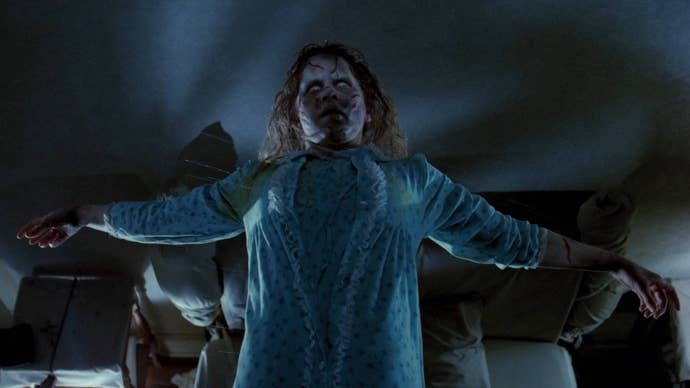
"It has to be The Exorcist," Miska said. "The movie carries a heavy social commentary, it's powerfully human, and it's still the scariest movie ever made (because of everything mentioned in my answer to question one.) For 40 years people have tried to emulate it and all have fall. All have failed."
"In games, Silent Hill 2 remains head and shoulders above the rest, with the original Amnesia a close second," Johnston began. "And you can accuse me of bias all you like, but I still say the first Dead Space is one of the scariest games you'll ever play. In literature, nothing beats Lovecraft for me. Despite the utterly surreal antagonists, nobody before or since has done a better job of reflecting the true horror of existence. And in movies, I always return to Se7en, Alien/s, and The Thing. I love a bit of schlock as much as the next guy, but smart, intelligent terror has an evergreen appeal to me."
Miska is correct in his earlier statement. There will always be horror in entertainment. It's not dying. It may lose its way occasionally or it may not be as large as it used to be, but it's always there. In video games, publishers sometimes lose the horror in the pursuit of profits.
Resident Evil lost its way as a horror series, but the upcoming Resident Evil: Revelations 2 looks like a return to form. Konami has been bouncing the Silent Hill franchise for years with no success, but P.T. hints at a new Silent Hill that embraces true horror. Nude Maker's Project Scissors is a spiritual successor to the Clock Tower series and the project is led by Clock Tower creator Hifumi Kouno. Shinji Mikami returned to the genre this month with The Evil Within.

All this is before you even touch all of the smaller horror projects that have released over the years: Corpse Party, Lone Survivor, Home, Amnesia, Slender: The Arrival, and Outlast. Even if the big companies forget, horror will always have a place in gaming.

